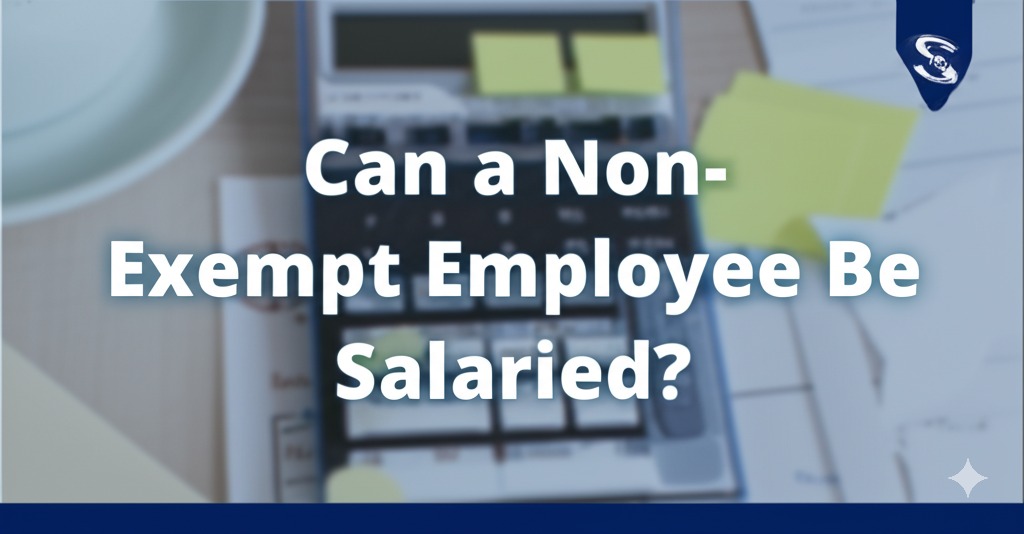
When it comes to employee classifications, few questions cause more confusion than this: Can a non-exempt employee be salaried? At first glance, “salaried” and “non-exempt” may seem like contradictory terms. However, understanding how these classifications work is crucial for both employers and employees to stay compliant with labor laws—especially under the Fair Labor Standards Act (FLSA).
In this article, we’ll break down the difference between exempt and non-exempt employees, explain how salary status fits in, and explore when a non-exempt employee can legally be paid on a salary basis.
What Does “Non-Exempt” Mean?
Under the Fair Labor Standards Act (FLSA), non-exempt employees are entitled to:
- Overtime pay at 1.5 times their regular hourly rate for any time worked over 40 hours in a workweek.
- Minimum wage protections ensuring they are paid at least the federal or applicable state minimum wage.
Unlike exempt employees—who are exempt from overtime and other protections—non-exempt workers must be paid for every hour they work.
What Does It Mean to Be “Salaried”?
A salaried employee is someone who receives a fixed amount of pay per week, regardless of how many hours they work. This is in contrast to hourly employees, who are paid based on the exact number of hours worked.
While most salaried employees are exempt, not all are. The key difference lies not in how they are paid (salary vs. hourly), but in whether they meet the FLSA criteria for exemption.
So, Can a Non-Exempt Employee Be Salaried?
Yes, a non-exempt employee can be salaried—but with important conditions.
If a non-exempt employee receives a fixed salary, employers must still:
- Track all hours worked.
- Pay overtime for any hours worked beyond 40 in a week.
- Ensure the employee’s hourly rate (based on their salary and hours worked) does not fall below the minimum wage.
In short, salary doesn’t override non-exempt status—it just changes how the base pay is structured.
When Does This Happen in Practice?
There are several scenarios where a salaried non-exempt arrangement makes sense:
1. Predictable Work Schedules
If an employee generally works the same hours every week but doesn’t meet exemption tests, paying a salary simplifies payroll while still complying with overtime rules.
2. Non-Exempt Professionals
Some technical or administrative workers may be highly skilled and well-compensated, but still fail the exemption tests (due to job duties or earnings thresholds). These workers might be salaried but are still non-exempt under the law.
3. State-Specific Wage Laws
Some states have stricter overtime or classification rules, leading employers to pay certain roles as salaried non-exempt to comply with both state and federal regulations.
Legal Requirements for Salaried Non-Exempt Employees
If you’re classifying an employee as salaried non-exempt, here’s what you must do to stay compliant:
1. Track Time Accurately
Even if the employee receives a salary, you must track all hours worked, including overtime.
2. Calculate Overtime Properly
For any hours worked over 40 in a week, the employee must be paid 1.5 times their regular rate. The regular rate is calculated by dividing the salary by the number of hours actually worked.
3. Minimum Wage Compliance
Ensure that the effective hourly rate (salary ÷ hours worked) never falls below the federal or state minimum wage.
4. Transparent Pay Policies
Be clear with employees about:
- How their salary is calculated
- When and how overtime is paid
- Expectations regarding working hours
Pros and Cons of Paying a Non-Exempt Employee a Salary
Pros:
- Simplified payroll for consistent schedules
- Predictable paychecks for employees
- May help with employee satisfaction and retention
Cons:
- Still requires strict time tracking
- Risk of compliance violations if overtime isn’t handled correctly
- Can lead to confusion among employees if not clearly explained
Common Myths About Salary and Exemption
Let’s bust a few myths:
- Myth 1: All salaried employees are exempt.
❌ False. Salary alone doesn’t determine exemption status. - Myth 2: Paying a salary eliminates the need to pay overtime.
❌ False. If the employee is non-exempt, overtime still applies. - Myth 3: Non-exempt employees must be hourly.
❌ False. They can be salaried as long as wage and hour laws are followed.
Conclusion: Salary and Non-Exempt Status Can Coexist
While it may seem counterintuitive, a non-exempt employee can legally be paid a salary. The key is ensuring full compliance with overtime, minimum wage, and timekeeping requirements under the FLSA and any applicable state laws.
If you’re an employer, consult with an HR professional or employment attorney to make sure your pay practices are fully compliant. If you’re an employee, understanding your rights ensures you’re properly compensated for your work.

Andre Cuevas provides career insights, job search strategies, and professional advice to help individuals navigate the job market and achieve their career goals.






